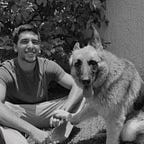Is there nothing left to discover?
“We were born too late,” Coco says. “There is nothing left to discover.”
It’s nine in the evening. We are sitting on the terrace of a cafe not far from the Reuilly Diderot metro. The weather is fresh and my beer is cold and Morpheus’ grip tightens around me with every sip that I take. It’s been a long day. I didn’t sleep more than two hours due to the uncomfortable heat of the night inside my insolated-walled room and the early rush to not miss my flight due to the infamous summer chaos at Arlanda airport.
I drink and listen to Coco and Brice talk. Both are experienced travelers. They met in India while she was solo-traveling from Iran to Thailand and Brice was starting a 7 months journey in Southeast Asia. Now, they discuss their next travel adventures. She wants to cross the Atlantic by boat while he plans to explore Latin America or Central Asia. Without a doubt, it will be something interesting.
As the night advances and the conversation goes on, both concur that conventional traveling is not enough to feel adventurous anymore. I’m too tired to agree or disagree. In my transitional state of consciousness between wakefulness and sleep, I hear Captain Barbossa’s voice:
“The world used to be a bigger place.”
“The world is still the same,” replies Jack Sparrow. “There is just less in it.” Both stare at the rotting corpse of the Kraken laying ashore in the depths of my memory.
Is there really nothing left to discover? What is this desire for adventure that we have in the first place? Where does it come from? I think about the romanticism of traveling and exploring, of living authentic experiences. Can we really find authentic experiences nowadays?
Being honest with myself, sometimes -most times- I don’t think we can. It is as if I have lost my enthusiasm for adventure. When I end up behind a guided group squishing between the crowded streets of Barcelona or Prague, looking at the same castles, same churches; walking through the same malls, same stores, and same type of tourists aiming with their selfies to capture instant -narcissistic- memories. When most travelers one encounters on Caribbean beaches and tropical islands in Southeast Asia are just drunk spring breakers. Then, the rotting Kraken emerges as a metaphor for the death of adventure -of the unknown- in this globalized era.
Several days go by and I find insight in the last pages of Travels with Herodotus by the Polish writer and journalist Ryszard Kapuscinski.
“There aren’t many such enthusiasts born,” he writes about the Ancient Greek historian.“The average person is not especially curious about the world. He is alive, and being somehow obliged to deal with this condition, feels the less effort it requires, the better… Most people develop quite antithetical talents to look without seeing, to listen without hearing, mainly to preserve oneself within oneself.”
I read these lines as if he was addressing me directly. Why do I feel that there is nothing new left to be seen? Have I lost my curiosity or have I just gotten lazy?
“We don’t really know what draws a human being out into the world,” reflects Kapuscinski. “Is it curiosity? A hunger for experience? An addiction to wonderment? The man who ceases to be astonished is hollow, possessed of an extinguished heart. If he believes that everything has already happened, that he has seen it all, then something most precious has died within him- the delight in life.”
He continues: “Herodotus is the antithesis of this spirit. A vivacious, fascinated, unflagging nomad, full of plans, ideas, theories. Always traveling… Travel is his vital exertion, his self-justification is the delving into, struggle to learn about life, the world, perhaps ultimately oneself.”
His words resonate in the core of my mind. My identity as a traveler, as an adventurer, is put into question. Why do I travel? What made me start traveling years ago? It was not the pursuit of unique experiences, those are just byproducts. No, what made me grab my backpack and go out into the unknown was to find something within myself, something that can only be found when one is put in an unfamiliar environment.
Traveling is not about discovering new places, but, as Kapuscinski and Herodotus himself did, it is about delving out of the comfort; facing different perspectives, and ideas, to ultimately learn about oneself. Coco and Brice are right in looking for adventure far away from the crowds and complacency. One will never find the extraordinary by following the path that tourist agencies draw for the sake of profit. Nevertheless, that doesn’t mean one has to travel far and expose him or herself to extreme situations. As long as one remains curious and enthusiastic, adventures will always present themselves wherever we are.
I feel my enthusiasm filling my soul again. It is not for travel or adventure but curiosity. I wonder about the lessons the future will bring. Life, the journey, goes on. And as long as it continues, so does the learning.
